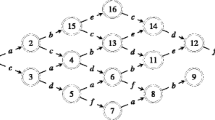Abstract
The paper studies in a unified manner both the class of closed, (Σu,N)-invariant, and (M, N)-recognizable sublanguages and the class of closed, (Σu,N)-invariant, and (M, Σc,N)-controllable sublanguages of a given languageL that arise in supervisor synthesis problems of discrete event dynamical systems with partial observations. The supremal element of the former class is often too restrictive, and it is natural to study maximal elements of the latter class. A procedure which computes such a maximal element as a limit of a decreasing sequence of sublanguages ofL is presented. Each term of the sequence is shown to be regular if a slightly modified procedure is used.
Similar content being viewed by others
References
Ramadge, P. J. and W. M. Wonham, Supervisory Control of a Class of Discrete Event Processes,SIAM J. Control Optim.,25 (1987), 206–230.
Wonham, W. M. and P. J. Ramadge, On the Supremal Controllable Sublanguage of a Given Language,SIAM J. Control Optim.,25 (1987), 637–659.
Cieslak, R., C. Desclaux, A. Fawaz, and P. Varaiya, Supervisory Control of Discrete Event Processes with Partial Observations,IEEE Trans. Automat. Control,33 (1988), 249–260.
Lin, F. and W. M. Wonham, On Observability of Discrete-Event Systems,Inform. Sci.,44 (1988), 173–198.
Cho, H. and S. I. Marcus, On Supremal Languages of Classes of Sublanguages that Arise in Supervisor Synthesis Problems with Partial Observation,Math. Control Signals Systems,2 (1989), 47–69.
Eilenberg, S.,Automata, Languages and Machines, Academic Press, New York, 1974.
Hopcroft, J. E. and J. D. Ullman,Introduction to Automata Theory, Languages, and Computation, Addison-Wesley, Reading, MA, 1979.
Ramadge, P. J., Some Tractable Supervisory Control Problems for Discrete Event Systems Modelled by Buchi Automata,IEEE Trans. Automat. Control,34 (1989), 10–19.
Fraisse, R.,Theory of Relations, Studies in Logic and the Foundations of Mathematics, vol. 118, North-Holland, Amsterdam, 1986.
Wonham, W. M. and P. J. Ramadge, Modular Supervisory Control of Discrete Event Systems,Math. Control Signals Systems,1 (1988), 13–30.
Ramadge, P. J. and W. M. Wonham, Modular Feedback Logic for Discrete Event Systems,SIAM J. Control Optim.,25 (1987), 1202–1218.
Lin, F. and W. M. Wonham, Decentralized Supervisory Control of Discrete-Event Systems,Inform. Sci.,44, (1987), 199–224.
Lafortune, S., Modeling and Analysis of Transaction Execution in Database Systems,IEEE Trans. Automat. Control,33 (1988), 439–447.
Author information
Authors and Affiliations
Additional information
This research was supported in part by the Air Force Office of Scientific Research under Grant AFOSR-86-0029, in part by the National Science Foundation under Grant ECS-8617860, and in part by the DoD Joint Services Electronics Program through the Air Force Office of Scientific Research (AFSC) Contract F49620-86-C-0045.
Rights and permissions
About this article
Cite this article
Cho, H., Marcus, S.I. Supremal and maximal sublanguages arising in supervisor synthesis problems with partial observations. Math. Systems Theory 22, 177–211 (1989). https://doi.org/10.1007/BF02088297
Received:
Revised:
Issue Date:
DOI: https://doi.org/10.1007/BF02088297




